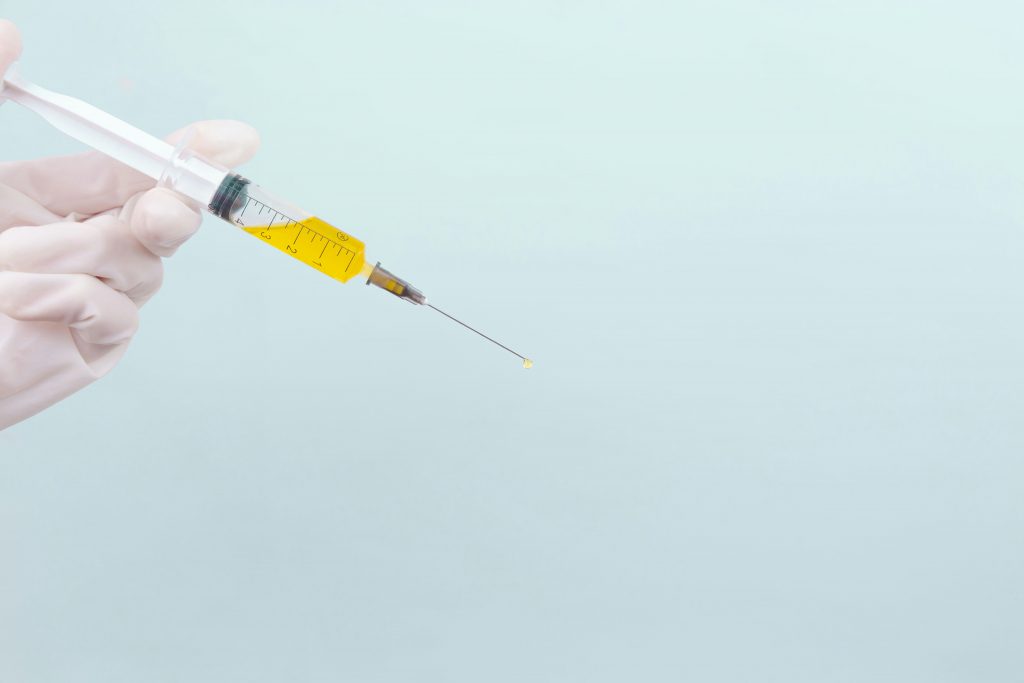TMJ Botox in Chicago

Two closely related oral health conditions are bruxism and temporomandibular joint dysfunction (TMJ) . These conditions tend to worsen over time in severity and can cause a decrease in your oral health amongst other health conditions. However, not all hope is lost. Botulinum toxin injections (botox) are one of the least invasive and most effective treatments for both these conditions. Today, learn all about bruxism and TMJ dysfunction. You’ll read about symptoms of each and how botox for TMJ in Chicago helps remedy both.
How Botox for TMJ Helps
Any conditions that affect your oral health shouldn’t be taken lightly. Not only are they painful, but they can cause serious harm to you if the conditions aren’t treated as soon as you notice symptoms. However, not everyone with these conditions know they have them until they see a dentist that diagnoses them with oral health conditions. To help you stay as happy and healthy as possible, it’s a good idea to have baseline knowledge of increasingly common health conditions and their treatments.
What is Bruxism?
By definition, bruxism is a sleep-related condition where people excessively clench their jaw or grind their teeth. Although bruxism might not seem like a big deal, it can cause serious health conditions if left untreated. In fact, some people don’t even realize they have bruxism until they get diagnosed with the condition by a dentist. To learn more about bruxism, continue reading.
Types of Bruxism
There are three main types of bruxism: nocturnal bruxism, awake bruxism, and bruxism in children.
Nocturnal Bruxism
As its name suggests, nocturnal bruxism only occurs when an individual is asleep. There may be numerous factors that cause nocturnal bruxism. Some of these factors are excessive stress, excessive frustration, and even excessive pain. Although it can already be difficult to know you have bruxism, it’s especially difficult with nocturnal bruxism cases. Unless your partner or someone else notices it while you’re sleeping, it’s often left unnoticed.
Awake Bruxism
Awake bruxism is characterized by only experiencing the teeth grinding and jaw clenching tendencies while awake. Awake bruxism is far less common than nocturnal bruxism. However, people with awake bruxism are more likely to notice they continuously grind their teeth or clench their jaw. Occasionally clenching your jaw or grinding your teeth won’t cause serious harm. It can also be difficult to know when to see a dentist regarding your bruxism symptoms.
Bruxism in Children
The rarest form of bruxism occurs in children. In fact, only about 20% of children will develop bruxism. Additionally, many children who develop bruxism will age out of it after they hit puberty. However, it is possible that it develops into full awake/nocturnal bruxism in adulthood if left untreated. This is why it’s really important to have your child see a dentist regularly! Prevent problems like these from being a detriment to your child’s oral health.
Symptoms of Bruxism
There are many different symptoms of bruxism. These different symptoms differ based on the severity of bruxism an individual has. It’s important that the severity of a patient’s bruxism is only diagnosed by a dentist. Although many mild cases can be solved and don’t require much treatment, it can develop into moderate or severe cases if symptoms are ignored. The three severities of bruxism are broken down here, along with all their symptoms.
Mild Bruxism
Mild bruxism is typically characterized by mild symptoms. These symptoms include, but aren’t limited to:
- A sore jaw
- Increased sensitivity when chewing
- An increase in headaches or migraines
- Scarring on the inside of one’s cheeks from chewing
- Pain or soreness of the tongue
- Mild enamel wear
Moderate Bruxism
Moderate bruxism symptoms start to get more concerning. If you notice any symptoms of moderate bruxism, see Dr. Mehta as soon as possible to get a treatment plan started. Here are symptoms of moderate bruxism:
- Some or all of the symptoms of mild bruxism
- More noticeable wear in the enamel
- Slight chips in a your teeth (chips you might not notice)
- Your teeth looking or feeling “worn down”
- Disturbed sleep patterns
Severe Bruxism
If you notice any of these symptoms, please see Dr. Mehta at your earliest convenience:
- Extremely worn down teeth
- Multiple chipped teeth
- Moderate to severe jaw pain
- Searing pain in your tongue
- Severe headaches that don’t seem to diminish
- Disturbed sleep patterns
- Severely sensitive teeth

What Is TMJ Dysfunction?
Your temporomandibular joint is the joint that connects your jawbone to your skull. It’s used in many daily activities, including talking, eating, swallowing, and any other activities where you use your jaw. You have this kind of joint on each side of your face. TMJ Dysfunction is characterized by a group of disorders that plague a person’s ability to use their jaw joint and muscles surrounding the joint.
It’s important to note that while bruxism and TMJ Dysfunction are separate conditions, they are closely related. Bruxism can cause individuals to develop TMJ Dysfunction in more severe cases, which is why the two conditions are so closely intertwined with each other in dentistry.
Causes of TMJ Dysfunction
There are many different causes of TMJ dysfunction. While this isn’t an exhaustive list, it’s still good to pay attention in case you notice any of them occurring with your own oral health.
Genetics is one of the biggest causes of TMJ Dysfunction. If your parents or someone in your direct family has poor jaw/mouth health or direct diagnosis of TMJ disorders, there’s a higher chance you develop the condition as you age.
If you’re worried about developing TMJ Dysfunction because of a strong family history of the condition, disclose this to Dr. Mehta when you’re in for regular cleanings. She’ll pay special attention to symptoms of the disorder so you’re on top of your oral health as much as possible.
Not all diagnoses of TMJ disorders are due to genetics. While genetics definitely play a role in the conditions you develop, external factors also play a role in that.
Although you might not think of excessive stress as a possible cause for TMJ disorders, stress can manifest itself into physical symptoms instead of only mental discomfort. When experiencing great stress, many individuals grind their teeth, clench their jaw, or chew on the inside of their mouths/lips without even realizing it.
Over time, these behaviors can become habit and cause more serious problems such as TMJ disorders. It’s always good to have a stress management plan in place so you stay as healthy as possible.
As discussed earlier, bruxism is another potential TMJ Dysfunction cause. Excessive teeth grinding and jaw clenching can lead to jaw pain and discomfort, amongst other things. If you have bruxism (or suspect you have it), pay close attention to your jaw health so you don’t unintentionally develop TMJ disorders
Some research suggests that if individuals have a low pain tolerance, they may have a greater chance of developing TMJ Dysfunction. If someone continues to have jaw pain with seemingly no relief, it can lead to stress on your temporomandibular joint that develops into the disorders.
Sudden injuries and other health conditions can also be to blame for TMJ Dysfunction. Collisions with your jaw or other parts of your face can cause soreness and injury to your jaw, which can cause TMJ Dysfunction even if it’s treated properly.
Additionally, health conditions such as arthritis or other joint/inflammatory conditions can also cause TMJ dysfunction.

Botox Injections as Treatment
Do you wish there was a way to stop the pain associated with your bruxism or TMJ disorder? A way that treats these conditions for good so you never have to put up with their nasty side effects again? You’re in luck! Botox for TMJ and Bruxism is an up-and-coming treatment perfect for individuals with these disorders. Learn all about these injections here.
What Are Botulinum Toxin Injections?
These types of injections are injections that utilize a toxin to prevent muscles from contracting for a certain amount of time. If you’re hesitant to try these injections because it sounds frightening, that’s completely understandable and okay. Chicago Loop Dentistry understands that it’s frightening to think about. However, there’s no need to worry. Dr. Mehta takes as best care of her patients as possible so they’re comfortable about their toxin injections every step of the way.
What’s In An Injection?
Each injection contains a solution of different things. It contains what’s known as a Clostridium botulinum type A neurotoxin, albumin, and sodium chloride. These injections are also known as botulinum toxin type A. Additionally, each injection is used without harmful preservatives so you know you’re getting the purest ingredients without any nasty chemicals.
Clostridium botulinum is the active ingredient that helps stop your muscles from contracting, while albumin helps carry the Clostridium botulinum molecules to their injection site. The sodium chloride merely acts as a natural preservative.
How Botulinum Toxins Treat Bruxism
Because these injections help suppress muscle activity for a limited time, they can be applied to the dental field. In cases of Bruxism, the botulinum toxin works to reduce muscle spasms around your jaw. Therefore, your jaw muscles don’t move as efficiently and aren’t able to assist your body in clenching your jaw and grinding your teeth.
Dr. Mehta places these botulinum toxin injections into three different places. The first area is the temporalis muscle. This muscle runs from the side of your skull to the backside of your lower jaw. The second site is the frontalis muscle, which is also referred to as the muscle covering your forehead. Lastly, she injects the botulinum toxin into your masseter muscle. The masseter muscle is found from below your cheekbone to underneath your jaw.
If you have any questions about whether or not you can get your bruxism treated with botulinum toxin injections, don’t hesitate to call Chicago Loop Dentistry. Dr. Mehta will be happy to help set up a personalized treatment plan for you.
How Botulinum Toxins Treat TMJ Dysfunction
These injections treat TMJ disorders very similarly to how they treat bruxism. Dr. Mehta places the injections at some or all of the temporalis, frontalis, and masseter muscles. These injections actively slow down the contractions of those muscles. This in turn helps people with TMJ disorders feel relief from the pain and stress placed on their temporomandibular joint.
It’s important to note that all treatment plans look different from person to person. Even if you and a sibling have the same condition and get treated with the injections, your treatment is personalized to your needs. Dr. Mehta works to create a customized plan that helps treat your specific case of TMJ dysfunction.
In Chicago, besides using botox for TMJ disorders and bruxism, Dr. Mehta provides these injections to patients for other reasons. Here are just a few of the toxin injection services Chicago Loop Dentistry has to offer.
One thing that Dr. Mehta can help you with is slimming and softening the appearance of your jawline. If you’re unhappy with how sharp your jaw looks or the way it’s proportionate to the rest of your facial features, make an appointment with Dr. Mehta. She’ll help make recommendations to you based on your personal preferences and get started with those injections right away.
Wrinkles are a sore subject for many people. While some don’t mind it, it makes many others self conscious about their appearance. Botulinum toxin injections not only help decrease the look of any facial wrinkles you have, but it helps prevent new wrinkles from forming, too.
The injections work to relax your forehead muscles, giving you a youthful appearance and less frown lines without a wrinkle in sight. If wrinkle prevention sounds like something you’re interested in, give Chicago Loop Dentistry a call today.
Another thing that botulinum toxin injections help with is decreasing gummy smiles. Naturally, some people show more of their gums when they smile than others. If you don’t want others to see your whole gumline or you just want to soften up your smile, then these injections are a great suggestion for you. Dr. Mehta will work with you and carefully inject the toxin so you have as little (or as much) of a gummy smile as you want.
Most people normally have questions about a new medical procedure like botulinum toxin injections. Here are some frequently asked questions about the injections so you feel a little bit at ease before your appointment with Dr. Mehta.
Most botulinum toxin injections last anywhere from 3-4 months. During your appointment, Dr. Mehta will tell you what to expect and how you should know when it’s time to schedule an appointment for more injections.
Botulinum toxin injections require a very minimal amount of time near the injection site. They normally don’t cause much pain to patients at all. If you’re concerned about the pain from your injections, Dr. Mehta will be happy to discuss numbing options with you for your procedure.
As with any procedure or injection, there are possibilities of experiencing major side effects. However, these side effects are rare and typically don’t affect patients at all. The most major side effects of injections include muscle weakness, flu like symptoms, and allergic reactions.
Most patients usually only experience minor pain, swelling, or bruising at the treatment area. All of these fade after the injected area has time to heal.
It may take anywhere from one to two weeks for the injection site to fully heal and you see satisfactory results. The most important thing to remember after an injection is to be gentle to the area. Don’t swing your head and neck around wildly, and wait three to four hours to touch the area.
When To Contact Dr. Mehta
It can be hard to know when to talk to Dr. Mehta about bruxism, TMJ dysfunction, or inquiring about botulinum toxin injections. However, there’s never a time that’s too early. If you notice any of the following things, it’s probably a good idea to schedule an appointment at Chicago Loop Dentistry sooner rather than later.
Jaw soreness and pain every once in a while isn’t unheard of. However, if you start to notice persistent pain or pain that comes and goes in waves, it’s a sign you need to get your mouth checked out by Dr. Mehta. She’ll run through some tests with you and get to the root of the problem so you can get back to your busy life as soon as possible.
Headaches can be caused by numerous different things. Dehydration, not good enough sleep, hunger, and dental problems are just some of the reasons why you may have a headache or chronic migraine. If you find yourself getting headaches after eating, drinking or doing anything intensive with your mouth/jaw muscles, there could be a link that needs to be checked out.
Bruxism and TMJ dysfunction aren’t the only causes of increased sensitivity when eating and drinking. Perhaps you simply ate something too cold or too hot. However, experiencing jaw or tooth pain every time you eat and drink may point toward possible bruxism or TMJ dysfunction. If you notice this newfound sensitivity, especially in combination with these other factors, schedule an appointment with Dr. Mehta at your earliest convenience. She’ll get everything figured out and provide you with a treatment plan that gets you feeling back to normal in no time.
Chipped teeth are a tough thing to notice right away when your teeth chip. However, if you notice some unusual gaps in your teeth or notches that don’t look natural, it’s never a bad idea to get those checked out. Even if it turns out that your teeth are fine, it’s better to be safe than sorry. If you do notice your tooth actively chipping, that’s okay. Don’t panic, and keep the portion of tooth that chipped off if at all possible. Call Dr. Mehta and get an appointment scheduled as soon as possible. She’ll repair your chipped tooth and identify why it was chipped to begin with.
Most everyone is familiar with how your adult teeth should look. They come with their own notches and grooves and are anything but flat surfaces. If you notice some of your teeth starting to flatten out or just not looking how a tooth normally looks, don’t hesitate to call Chicago Loop Dentistry to receive injections.
There are many potential causes of worn-down teeth, and not all causes are bad. It’s better to make an appointment now than to wait and cause further problems.
If you start developing wrinkles in your forehead that you’re just not comfortable with anymore and want to watch them disappear, call Dr. Mehta! She’ll reduce the appearance of your wrinkles and prevent further wrinkles from forming.
Ready to Upgrade Your Smile?
Compassionate care. Modern technology. Exceptional results.


